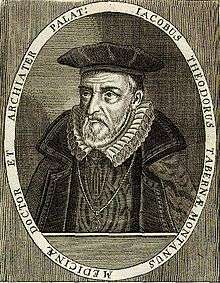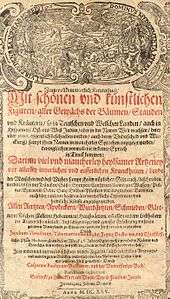Jacobus Theodorus Tabernaemontanus
Jacobus Theodorus (Jacob Diether), called Tabernaemontanus (1525 – August 1590) was a physician and an early botanist and herbalist, the "father of "German botany"[1] whose illustrated Neuw Kreuterbuch (1588) or Eicones Plantarum (Frankfurt, 1590) was the result of a lifetime's botanizing and medical practice. It provided unacknowledged material for John Gerard's better-known Herball (London, 1597) and was reprinted in Germany throughout the 17th century. His Latinized name represented a translation of his native town, Bergzabern (lit. 'mountain taverne') in the Palatinate. Tabernaemontanus began as a student of the pioneer of Renaissance botany, Hieronymus Bock.
Jacobus Theodorus Tabernaemontanus | |
|---|---|
 | |
| Born | 1525 |
| Died | August , 1590 (aged 64–65) |
| Nationality | German |
| Known for | physician, botanist, and herbalist |
The career of Tabernaemontanus was supported in the usual manner of his time: by a series of places as court physician to German nobles. In 1549 he was the private doctor to Philip III, Count of Nassau-Weilburg and later to Marquard von Hattstein, bishop of Speyer. Later he served as town physician to the free imperial city of Worms, Germany. Johannes Posthius and William Turner (Bad Bergzabern) were friends of Tabernaemontanus.
Tabernaemontanus studied University Heidelberg, where he spent the last decades of his life, in Bock's footsteps, as physician to his liege lord, the Prince-Elector and where he died, having been three times married and the father of eighteen children. He is commemorated in the pan-tropical genus of flowering shrubs and small trees Tabernaemontana; the French botanist Charles Plumier (born 20.04.1646 Marseille/died 20.11.1704 Santa Maria) erected the genus, as a compliment to Tabernaemontanus, and it was adopted by Linnaeus.
Works

- Neuw Wasserschatz[2] (1581)
- Neuw Kreuterbuch (Frankfurt, 1588) the first version of the masterwork on which his posthumous reputation is based.
- Eicones plantarum seu stirpium[3] (Frankfurt, 1590) illustrated with 2255 woodcuts of plants.
- Iacobi Theodori Tabernaemontani New vollkommen Kräuter-Buch : darinnen uber 3000 Kräuter, mit schönen und kunstlichen Figuren, auch deren Unterscheid und Wirckung, sampt ihren Namen in mancherley Spraachen beschrieben, deßgleichen auch, wie dieselbige in allerhand Kranckheiten, beyde der Menschen und des Viehs, sollen angewendet und gebraucht werden, angezeigt wird. Theodorus, Jacobus. Basel : König / Werenfels, 1664. Digital edition of the University and State Library Düsseldorf.
- Jacobi Theodori Tabernæmontani Neü vollkommen Kräuter-Buch : Darinnen Uber 3000. Kräuter/ mit schönen und kunstlichen Figuren/ auch deren Underscheid und Würckung/ sam̄t ihren Namen in mancherley Sprachen beschrieben ; Deßgleichen auch/ wie dieselbige in allerhand Kranckheiten/ beyde der Menschen und des Viehs/ sollen angewendet und gebraucht werden/ angezeigt wird. Basel ; Offenbach am Mäyn : König, 1731. Digital edition of the University and State Library Düsseldorf.
Notes
Wolf-Dieter Müller-Jahncke / Ulrike Bofinger: Jacob Theodor named Tabernaemontanus ( 1522-1590 ) born Bergzabern " Rosarium literarum, articles Pharmazie Historie . Hans Gerhard Christoph: specially publication Saarland-Museum / Saarbrücken 475.birthday of botanic Prof. Jacob Theodor named Tabernaemontanus.1. August - 1.November 1998 exhibition. Hans Gerhard Christoph: specially publication together with exhibition, Heidelberg University ( Ruprecht-Karls-University ) Gynäkologische Nachrichten 2/99 page 23. Hans Gerhard Christoph : Tabernaemontanus - Bedeutender Mediziner und Botaniker " RHein-Neckar-Zeitung ( News Number 18 ) page 9 Hans Gerhard Christoph: Tabernaemontanus " Leben und Werk " Naturheilpraxis / Pflaum Verlag München. Hans Gerhard Christoph: specially edition together with exhibition, Kraków ( Krakau ) Biblioteka Jagiellonska University
Karl Mägdefrau : history of botanic 2.edition 1998
References
- Jacobus Theodorus Tabernaemontanus
- "The New water cure".
- "Images of plants and roots".